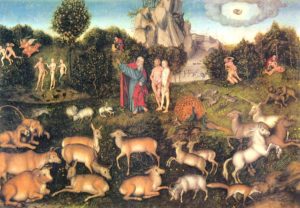Thoughts on Sunday’s Lessons for Oct. 7, 2018

The Garden of Eden (1350), oil painting on poplar wood by Lucas Cranach the Elder (1472-1553). The Gemäldegalerie Alte Meister , Dresden, Germany. (Click image to enlarge.)
First Reading (Track One): Job 1:1; 2:1-10
Many people find the story of Job and his troubles disheartening, particularly considering that a casual reading may give the impression that God caused suffering for Job because, literally, Satan talked him into it. But let’s be positive: Job is a great short story and an important part of the Bible’s wisdom literature, the books that teach us about life and God. Don’t we all wonder how bad things can happen to good people? Listen and ponder as we read through Job in the next four weeks. We hear parts of the beginning of Job today, and it starts off like an ancient folk tale. Remember, too, that in that time Satan was not understood as a devil with horns, but a kind of prosecutor or adversary in the heavenly order.
First Reading (Track Two): Genesis 2:18-24
Sunday’s readings aren’t easy. First, we hear a part of the second creation narrative in Genesis, a legend about Eve being made from Adam’s rib, that some have interpreted to place women in secondary status to men. Then in Mark’s Gospel we hear Jesus reject divorce in words so strict that they have been invoked to hold people in abusive relationships. Think about relationships in all today’s readings, trying to read them faithfully yet generously. Perhaps they invite us to think about all creation, and God’s universal call to men and women to be responsible for our relationships with plants, animals and each other. Hold these thoughts, too, as we celebrate St. Francis with our Blessing of the Animals.
Psalm (Track One): Psalm 26
Just as Job, we are told, was “blameless and upright, one who feared God and turned away from evil,” the Psalmist in today’s reading declares before God that he has lived with integrity, trusting in God without faltering. In the light of Job’s trials, one might wonder if the author of this psalm is testing fate when he invites God to “test me … and try me.” We may also hear hint of Pharisaical self-satisfaction in his desire not to be counted among the evildoers or to suffer their punishment. But in the end his plea is humble, promising integrity and asking for God’s pity and redemption.
Psalm (Track Two): Psalm 8
This resounding hymn of praise for God expresses our awe at the many glories of God’s creation. The heavens, the moon, the stars in their courses are all the work of God’s hands. The majestic arc of creation is so great that mere humanity seems small in comparison. Yet God has given humanity charge of all the animals, wild and domestic, and all the creatures of the sea. Surely we are called to exercise the same level of careful and loving relationship with this creation as we count on God to provide for us.
Second Reading: Hebrews 1:1-4; 2:5-12
Why does God care for mere mortals so much that he sent a son and savior, the reflection of God’s glory and the exact imprint of God’s being, to become “lower than the angels” to live and die among us? Hear the echo of Psalm 8 in these verses as the author of Hebrews quotes a portion of it directly. This letter is thought to have been written to coax back Jewish Christians who had returned to Judaism in the face of persecution late in the first century. In this passage we hear that Jesus tasted death for all of us, through his sufferings raising us all up as his brothers and sisters.
Gospel: Mark 10:2-16
Jesus’ strict command against divorce is difficult to hear in a modern times, when divorce has become acceptable, if unhappy; a troubled end to a relationship. In the patriarchal culture of Jesus’ time, divorce was even worse, because it was inequitable: A man could set aside his marriage for any reason, or keep his wife trapped in abusive relationship. A woman had no recourse, could not practically initiate divorce, and worse, a woman alone was likely to end up homeless and hungry, shamed and reduced to begging. Should it surprise us that Jesus spoke firmly against that, recalling the words of Eve’s creation from Genesis? Then, in the next segment, when we see Jesus holding and blessing little children, we begin to see Jesus’ idea of God’s kingdom in the image of a child: Don’t judge others. Don’t be unkind.
What are “Track 1” and “Track 2”?
During the long green season after Pentecost, there are two tracks (or strands) each week for Old Testament readings. Within each track, there is a Psalm chosen to accompany the particular lesson.
The Revised Common Lectionary allows us to make use of either of these tracks, but once a track has been selected, it should be followed through to the end of the Pentecost season, rather than jumping back and forth between the two strands.
For more information from LectionaryPage.net, click here.
